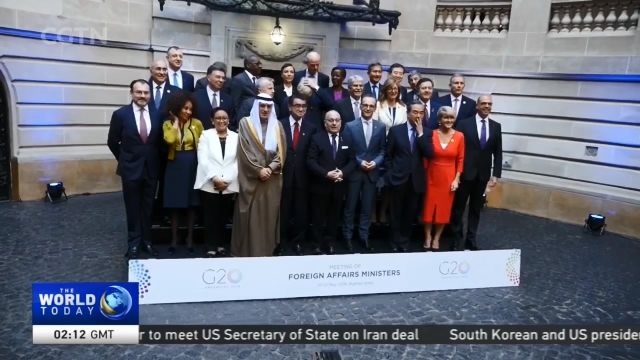
11:12, 22-May-2018
G20 FM Meeting: Ministers to discuss Venezuelan elections, tariffs, sustainable food production
01:56

'No' to protectionism: that's the word from the G-20 ministers in Argentina. Foreign Ministers and Central Bank Governors on Monday rejected U.S. tariffs on steel and aluminum. They also condemned the presidential election in Venezuela. But, CGTN's Joel Richards reports that the group will also be discussing a challenge that affects everyone: food.
Argentina produces food for an estimated 400 million people, according to the country's foreign minister, who said it aims to increase that by 50% in the coming years.
Argentina is the world's third largest soybean producer. But a prolonged drought, followed by heavy rains, has affected the harvest.
Yet some sectors, including fruit, are expanding. Last year, Argentina reached an agreement with China to export blueberries.
The company Extraberries has been around for two decades. Sales manager Matias Notti says Argentina needs to improve infrastructure to meet a growing global demand.
MATIAS NOTTI SALES MANAGER, EXTRABERRIES "Technology and robotics allow much greater control to reject fruit and goods the market doesn't not want. It's important to have investment plans for the short, medium and long term, in addition to government support, and technology to have a more healthy product."
This week's meeting of the G20 foreign ministers is a chance for nations to discuss and work toward multilateral agreements on these issues.
JOEL RICHARDS BUENOS AIRES "As hosts of the G20 Leaders' Summit scheduled later this year in Buenos Aires, Argentina has outlined three priorities: food security, infrastructure and jobs. But when the foreign ministers gathered on Monday, the focus was elsewhere."
Regional politics dominated the headlines. Six nations at the ministerial meeting rejected the presidential election results in Venezuela.
Leaders from the G20 countries and invited nations meet in Argentina in late November.

SITEMAP
Copyright © 2018 CGTN. Beijing ICP prepared NO.16065310-3
Copyright © 2018 CGTN. Beijing ICP prepared NO.16065310-3